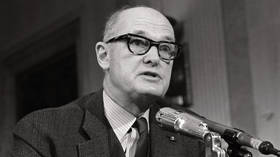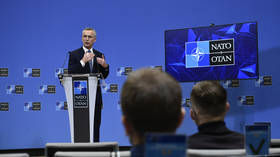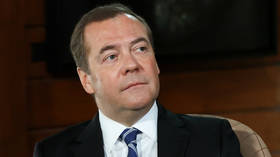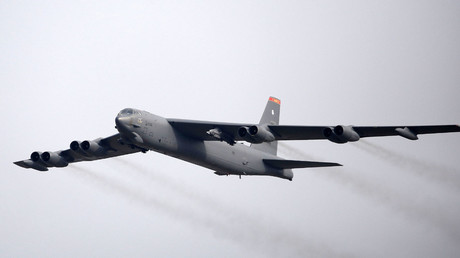
The US diplomat George Kennan, an astute observer of Soviet Russia under Stalin, offered his observations later in life on the question of NATO expansion. The tragedy of our times is that those views are being ignored.
Winston Churchill once famously quipped that the “Americans will always do the right thing, but only after all other possibilities are exhausted.” That bit of dry British humor cuts to the heart of the current crisis in Ukraine, which is loaded with enough geopolitical dynamite to bring down a sizable chunk of the neighborhood. Yet, had the West taken the advice of one of its leading statesmen with regards to reckless military expansion toward Russia, the world would be a more peaceful and predictable place today.
George Kennan is perhaps best known as the US diplomat and historian who composed on February 22, 1946 the ‘Long Telegram’, a 5,400-word cable dispatched from the US embassy in Moscow to Washington that advised on the peaceful “containment” of the Soviet Union. That stroke of analytical brilliance, which Henry Kissinger hailed as “the diplomatic doctrine of his era,” provided the intellectual groundwork for grappling with the Soviet Union under Joseph Stalin as ultimately enshrined in the ‘Truman Doctrine’.
Inside the fetid corridors of power, however, where the more hawkish Dean Acheson had replaced the ailing George Marshall in 1949 as secretary of state, Kennan and his more temperate views on how to deal with capitalism’s arch rival had already passed its expiration date. Such is the fickleness of fate, where the arrival of a single new actor on the global stage can alter the course of history’s river forever. Thus, having lost his influence with the Truman administration, Kennan eventually began teaching at the Institute for Advanced Study, where he remained until his death in 2005. Just because George Kennan was no longer with the State Department, however, didn’t mean that he stopped ruffling the feathers of predators.
In 1997, with Washington elves hard at work on a NATO membership drive for Central Europe, particularly those countries that once formed the core of the Soviet-era Warsaw Pact, Kennan pulled the alarm. Writing in the pages of the New York Times, he warned that ongoing NATO expansion toward Russia “would be the most fateful error of American policy in the entire post-cold-war era.”
Particularly perplexing to the former diplomat was that the US and its allies were expanding the military bloc at a time when Russia, then experiencing the severe birth pains of capitalism atop the smoldering ruins of communism, posed no threat to anyone aside from itself.
“It is … unfortunate that Russia should be confronted with such a challenge at a time when its executive power is in a state of high uncertainty and near-paralysis,” Kennan wrote.
He went on to express his frustration that, despite all of the “hopeful possibilities engendered by the end of the cold war,” relations between East and West are becoming predicated on the question of “who would be allied with whom” in some “improbable future military conflict.”
In other words, had Western dream weavers just let things work themselves out naturally, Russia and the West would have found the will and the way to live side-by-side in relative harmony. One example of such mutual cooperation is evident by the Nord Stream 2 pipeline, a bilateral project between Moscow and Berlin that hinges on trust and goodwill above all. Who needs to travel around the world for war booty when capitalism offers more than enough opportunities for elitist pillage right at home? Yet the United States, having snorted from the mirror of power for so long, will never be satisfied with the spectacle of Russians and Europeans playing nice together.
As for the Russians, Kennan continued, they would be forced to accept NATO’s program of expansionism as a “military fait accompli,” thereby finding it imperative to search elsewhere for “guarantees of a secure and hopeful future for themselves.”
Needless to say, Kennan’s warnings fell on deaf ears. On March 12, 1999, then US Secretary of State Madeleine Albright, an acolyte of geopolitical guru and ultimate Russophobe Zbigniew Brzezinski, formally welcomed the former Warsaw Pact countries of Poland, Hungary, and the Czech Republic into the NATO fold. Since 1949, NATO has grown from its original 12 members to thirty, two of which share a border with Russia in the Baltic States of Estonian and Latvia, which has been the site of massive NATO military exercises in the past.
So while it is impossible to say how things would be different between Russia and the West had the US heeded Kennan’s sage advice, it’s a good bet the world wouldn’t be perched on the precipice of a regional war over Ukraine, which has become a center of a standoff between Moscow and NATO.
Russia certainly does not feel more secure as NATO hardware moves inexorably toward its border. Vladimir Putin let these sentiments be known 15 years ago during the Munich Security Conference when he told the assembled attendees: “I think it is obvious that NATO expansion does not have any relation with the modernization of the Alliance itself or with ensuring security in Europe. On the contrary, it represents a serious provocation that reduces the level of mutual trust. And we have the right to ask: against whom is this expansion intended?”
Today, with Kiev actively pursuing NATO membership for Ukraine, and the West stubbornly refusing to acknowledge Moscow’s declared ‘red lines’, outlined in two draft treaties sent to Washington and NATO in December, the situation looks grim. What the West must understand, however, is that Russia is no longer the special needs country it was just 20 years ago. It has the ability – diplomatic or otherwise – to address the perceived threats on its territory. There has even been talk of Russia, taking its cue from NATO’s reckless expansion in Europe, building military alliances in South America and the Caribbean.
Last month, Foreign Minister Sergey Lavrov reported that President Putin had spoken with the leaders of Cuba, Venezuela, and Nicaragua, for the purpose of stepping up collaboration in a range of areas, including military matters.
With each passing day it is becoming more apparent that had Kennan’s more realistic vision of regional cooperation been accepted, the world would not find itself at such a dangerous crossroads today. Fortunately, there is still time to reconsider the advice of America’s brilliant diplomat if it is peace that Washington truly desires.
The statements, views and opinions expressed in this column are solely those of the author and do not necessarily represent those of RT.




No comments:
Post a Comment